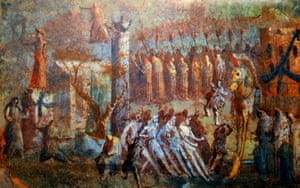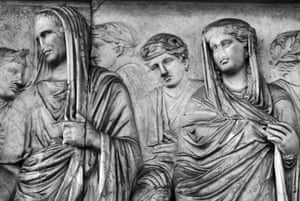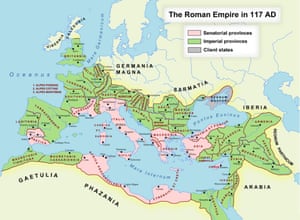Mary Beard: why ancient Rome matters to the modern world
Failure in Iraq, debates about freedom, expenses scandals, sex advice … the Romans seem versions of ourselves. But then there’s the slavery and the babies on rubbish heaps. We need to understand ancient Rome, but should we take lessons from it?
By the late fourth century CE the river Danube had become Rome’s Calais. What we often call the “invasions” into the Roman empire of barbarian hordes (or “swarms”, perhaps) could equally well be described as mass movements of economic migrants or political refugees from northern Europe. The Roman authorities had no better idea of how to deal with this crisis than our own authorities do, and, predictably, they were less humane. On one notorious occasion, uncomfortable even for some Roman observers, they sold dog-meat as food to the asylum-seekers who had managed to get across the river (dog was off limits for human consumption then as now). It was just one stage in a series of standoffs, compromises and military conflicts that eventually destroyed central Roman power in the western part of their empire. And it was exacerbated by the calculating policy of the Romans in the east, who by this era effectively formed a separate state. Their solution to the crisis of migration was to point the migrants firmly westwards, and try to make them someone else’s problem.
It’s tempting to imagine the ancient Romans as some version of ourselves. They launched disastrous military expeditions to those parts of the world where we too have failed. Iraq was as much a graveyard for the Romans as it has been for us. And one of their worst defeats, in 53BCE at the hands of a rival empire in the east, took place near the modern border between Syria and Turkey. In a particularly ghoulish twist, uncomfortably reminiscent of the sadistic showmanship of Islamic State, the head of the Roman commander was cut off and used by the enemy as a makeshift prop in a performance of Euripides’ play The Bacchae – in which the head of King Pentheus, horribly decapitated by his mother, takes a macabre starring role.
Back in Italy too, Roman life had a familiar side. Urban living in a capital city with a million inhabitants, the biggest conurbation in the west before the 19th century, raised all the usual questions: from traffic congestion (one law tried to keep heavy vehicles out of the city during the day, with the knock-on effect of appalling noise at night) to rudimentary planning problems (exactly how high were high-rise blocks allowed to be, and in what materials to make them safe from fire?). Meanwhile the political classes worried about everything from expenses scandals to benefits scroungers. There was endless, and largely unsuccessful, legislation aimed at preventing officials lining their own pockets out of the public purse. Even the famously upright Marcus Tullius Cicero – politician, poet, philosopher and jokester – left one overseas posting with a small fortune in his suitcase; he had apparently been “economical” with his expenses allowance.
There was also endless debate over the distribution of free or subsidised grain to citizens living in the capital, one half of the infamous pair of “bread and circuses”, which, according to a hard-nosed Roman satirist, had sapped the political energy and independence of the people. Was this a proper use of the state’s resources and a precedent to be proud of – the first time any state in the west had decided to guarantee the basic subsistence of many of its citizens? Or was it an encouragement to idleness, and an extravagance that the exchequer could not afford? One rich Roman conservative was once caught standing in line to collect this allowance of which he vehemently disapproved and certainly did not need. When asked why, he replied: “If you’re sharing out the state’s property, I’ll come and take my cut, thank you.” This is not far from the logic of the elderly modern millionaire who claims his free TV licence or bus pass.
But it is not so simple. To study ancient Rome from the 21st century is rather like walking on a tightrope – a careful balancing act, which demands a very particular sort of imagination. If you look down on one side, everything does look reassuringly familiar, or can be made to seem so. It is not just the military escapades or the problems of urban life and migrants. There are conversations going on that we almost join, about the nature of freedom or the problems of sex. There are jokes we still “get”, buildings and monuments we recognise and family life lived out in ways we understand, with all their quarrels, divorces and troublesome adolescents. Cicero’s disappointment in the first century BCE with his son Marcus, who, at university in Athens, preferred clubbing and drinking to attending lectures on philosophy, is one that many of us can share. So too is the dilemma revealed by a surviving Roman do-it-yourself fortune-telling kit. Among the many questions it lists for anxious consulters is: “Will I get caught in adultery?” And among the many possible responses you could receive (depending on how the dice fell) was the wise and realistic: “Yes, but not yet.”
On the other side of the tightrope, however, is completely alien territory. Some of that strangeness is well recognised. The institution of slavery disrupted any clear idea of what it was to be a human being (neither Greeks nor Romans ever worked out whether slaves were things or people). The filth of the place was, in our terms, shocking. There was hardly any reliable system of refuse collection in ancient Rome, or in any ancient city, and there were revealing stories about stray dogs walking into posh dinner parties clutching in their mouths human body parts they had picked up in the street. And that’s not to mention the slaughter in the gladiatorial arena or the death from illnesses whose cure we now take for granted. More than half of the Romans ever born would have died before they were 10 years old. Childbirth was as deadly to women as battle was to men.
Less well known are the thousands of unwanted new‑born babies who were thrown on to rubbish heaps (or “exposed” to use the modern scholarly euphemism); the boundary between contraception and infanticide was a blurred one, and disposing of children after birth was safer than getting rid of them before. Likewise overlooked are the young Roman girls, who were not uncommonly married by the age of 13 or 14, and sometimes even earlier, into what we would have little hesitation in calling child abuse. How soon these marriages were consummated is anyone’s guess, but Cicero’s response, on the eve of his second marriage, to questions about why, in his 60s, he was taking as a bride a young virgin, a child in her mid-teens, is instructive. “Don’t worry,” he said, “she’ll be a grown-up woman tomorrow” (that is, a virgin no longer). The ancient critic who quoted this answer thought that it was a brilliantly witty way of deflecting criticism, and held it up for admiration. We are likely to put it somewhere on the spectrum between uncomfortably coarse and painfully bleak – one powerful marker of the distance between the Roman world and our own.
***
The truth is that Roman history offers very few direct lessons for us, and no simple list of dos and don’ts. We hardly need to read of the difficulties of the Roman legions on the Syrian borders to understand that modern military interventions in western Asia might be ill‑advised, or that feeding inedible food to refugees is likely to rebound. I am not even certain that those modern generals who boast of following the tactics of Julius Caesar or Hannibal really do so, in anything more than their own imaginations; most military victories in the ancient world were achieved by massive superiority in numbers or by some variety of “going round the back” of the enemy and capturing them in a pincer movement (“tactics”, in any more sophisticated sense, just weren’t in it). Besides, “the Romans” were no less divided about how they thought the world worked, or should work, than we are. There is no simple Roman model to follow, or reject. If only things were that easy.
Ancient Rome still matters for very different reasons – mainly because Roman debates have given us a template and a language that continue to define the way we understand our own world and think about ourselves, from high theory to low comedy, while prompting laughter, awe, horror and admiration in more or less equal measure. Of course, western culture is not the heir of the classical past alone, nor would anyone wish it to be. There are, happily, many different influences woven into our cultural fabric: Judaism, Christianity and Islam only three of the most obvious. But since the Renaissance at least, many of our most fundamental assumptions about power, citizenship, responsibility, political violence, empire, luxury, beauty, and even humour, have been formed, and tested, in dialogue with the Romans and their writing.
We see that in the vocabulary of modern politics, from “senators” to “dictators”, and in our own catchphrases and cliches. “Fiddling while Rome burns” is a reference to the emperor Nero playing his lyre while the city went up in flames in the great fire of 64CE (not, as is now often assumed, “fiddling” in the modern sense of fussing aimlessly). “Fearing Greeks even when bearing gifts” is how Virgil in his Aeneid scripted the warning of one of the Trojan elders at the appearance of the great “Trojan horse”, a treacherous present from their Greek enemies. And the single Latin word “plebs” is still an insult, whether actually uttered or not, that can force a government minister to resign. We see it too in the political geography of modern Europe. The main reason that London is the capital of the United Kingdom, so inconveniently located in many respects, is that the Romans made it the capital of their province Britannia – a dangerous place lying, as they saw it, beyond the great ocean that encircled the civilised world. Britain is in many ways a Roman creation.
Twenty years before Caesar’s murder there was another event that has had an equally long afterlife in western history and thought. While he held the chief office of the Roman state, the consulship, in 63BCE, Cicero uncovered what he claimed (and probably believed) to be a terrorist plot to overthrow the government and to eliminate several of its senior politicians, himself included. The mastermind was supposedly a bankrupt aristocrat by the name of Catiline, who had turned to revolution when he had failed to reach power by legitimate means. Cicero had been tipped off by his undercover agents, intelligence reports and intercept evidence, and so – displaying a breastplate under his toga (more or less the equivalent of turning up at the House of Commons with a bulletproof vest and pistol) – he denounced Catiline who quickly fled, and he rounded up the other conspirators. These he executed without trial, in the interests of homeland security. “Vixere,” he announced, in a chilling understatement, as he emerged from the prison where he had overseen their punishment: “They have lived.” That is: “They are dead.”But even more importantly, we have inherited from Rome many of the fundamental principles and symbols with which we define and debate politics and political action. The assassination of Julius Caesar on the “Ides of March” in 44BCE was in reality a bungled and slightly seedy operation. Despite Shakespeare’s glamorising recreation of the conspiracy, it was headed by the decidedly unattractive Marcus Junius Brutus, whose previous claim to fame had been to extract an almost 50% rate of interest for loans to the unfortunate people of Cyprus (when they could not come up with the repayments he had the main council chamber on the island besieged, starving five councillors to death in the process). It caught several innocent people in what we would call “friendly fire”. And in the medium term it did more to bring about one-man rule in Rome than to eradicate it as the assassins had hoped. Yet, helped no doubt by the Shakespearean version, it has provided the model and the justification for destroying “tyrants” in the name of “liberty” ever since. It is no coincidence thatJohn Wilkes Booth used “Ides” as the code word for the day on which he planned to kill Abraham Lincoln. Almost every assassination in western politics has been seen against the background of the Ides of March.
We know about this incident almost wholly from Cicero’s side; in fact, four speeches that he delivered accusing Catiline of treason and revealing what he knew of the plot went on to the Roman school curriculum almost immediately, as models of persuasive oratory, and have been read and studied ever since. The speeches still have their foothold in the modern western school curriculum, albeit a considerably more tenuous one. But we also know that there was another side to the debate. Whatever Catiline was really up to (and there is still disagreement about how far the “reds under the bed” were a figment of Cicero’s conservative imagination or paranoia), every Roman citizen had the fundamental right to due process and fair trial; summary execution contravened the most basic of civil liberties, then as now. Cicero did not escape scot-free. He was shortly sent into exile, his house in Rome was demolished, and a shrine to the goddess Liberty was pointedly constructed on its site.
Over the centuries Cicero and Catiline have hovered in the background of these and other political debates, and have sometimes provided an explicit template for them. Writing a play on the subject in the aftermath of the Gunpowder Plot, Ben Jonson turned Catiline into a sadistic anti-hero (though his Cicero was an almost equally unattractive droning bore), while from the other side of the political spectrum Henrik Ibsen, in the fallout of the European revolutions of the 1840s, imagined a highly principled Catiline pitted against the corruption of the world in which he lived. Even now, the very words that Cicero used in his speeches against Catiline – and especially the first line of the first speech “Quousque tandem abutere, Catilina, patientia nostra?” (“How long, Catiline, will you go on abusing our patience”) – get replayed as a signal of fundamental and principled political opposition. That goes from the hard-line Republican senator for Texas, Ted Cruz, who just last year started his attack on Barack Obama’s immigration plans with the words, “When, President Obama, do you mean to cease abusing our patience?”, to protesters against the government in Hungary a couple of years before who emblazoned banners with just the words Quousque tandem. No more needed to be said.The exile was unpleasant for Cicero, and copies of his unattractively self-pitying letters, sent back to his family and friends, still survive. Roman men did not often have the stiff upper lips of popular imagination, and Cicero wallowed in his tears. But the crying did not last long, for in a year he was recalled – in his account again – to a hero’s welcome and to the rebuilding of his house. His career, however, never fully recovered and the basic clash between, on the one hand, the obligation on the elected officials of the state to ensure its security and, on the other, the civil liberties of every citizen, no matter how criminal, continued to be debated – as it still is, whether in relation to detention without trial, Guantánamo Bay or British drone strikes against British citizens in Syria.
***
What is important here is the debate, not the resolution. Ancient Rome is not a simple lesson for us, nor is it a civilisation that we should gratefully admire. There is much in the classical world – both Roman and Greek – to engage our interest and demand our attention. But admiration is a different thing. After 50 years of working on, and with, the Romans, I bridle when I hear people talking, as they so often do, of “great” Roman conquerors, or even of Rome’s “great” empire. That certainly wasn’t what it looked liked from the other end of Roman swords. But admiration apart, Roman debates are embedded in our own, and they are embedded in those of our predecessors who have in turn bequeathed their own problems, solutions and interpretations to us. I am not only referring to debates on Catiline and civil liberties, but also to the lurid, largely fictional, anecdotes of Roman emperors that have framed our own views of political corruption and excess (where does autocratic excess end and a reign of terror begin?), or the justifications, bad and good, for imperial expansion and military intervention.
Our own world would be immeasurably the poorer, and immeasurably less comprehensible to us, if we did not continue to interact with the Roman past. If we want, for example, to understand why John F Kennedy, like Lord Palmerston before him, chose to adopt the slogan Civis Romanus sum (“I am a Roman citizen”) – in Kennedy’s case as a defence of the freedom of West Berlin, in Palmerston’s in defence of some gunboat diplomacy – we need to keep engaged with the history of ancient Rome itself, with Roman approaches to citizenship and nationhood, and why they might underpin our own. Cynically, we should probably also wonder whether Kennedy (or Palmerston) actually knew that their cherished slogan had first become a Roman commonplace after being uttered as a desperate plea from a tragic Sicilian as he was pinned to a cross and illegally crucified by a rogue Roman provincial governor in the first century BCE – a plea that had no effect whatsoever.
Inevitably, the Rome with which we engage is a moving target. Roman history has changed dramatically over the last 50 years, and even more so over the last 250 years since Edward Gibbon wrote The Decline and Fall of the Roman Empire, his idiosyncratic historical experiment that began the modern study of Roman history in the English-speaking world (and which certainly would have been on Palmerston’s desk). That is partly because of the new ways of looking at the old evidence, and the different questions we choose to put it. It is a dangerous myth that we are better historians than our predecessors. We are not. But we come to Roman history with different priorities – from gender identity to food supply – that makes the ancient past speak to us in a new, as well as an old, idiom. Whereas once the empress Livia, wife of the first emperor Augustus, was presented as a scheming manipulator and poisoner, we are now much more sensitive to the way male traditions tend to project villainy and self-interest on to women who have the fortune, or misfortune, to be married to the man in charge (think Cherie Blair). Livia may not have been a shy retiring lady innocent of all machinations, but we now realise that we would be the dupes of a tendentiously patriarchal vision to think of her simply as the wicked witch behind the throne.
There have also been an extraordinary array of new discoveries – in the ground, under water, even lost in libraries – presenting novelties from antiquity that tell us more about ancient Rome than any modern historian before us could ever have known. We now have a manuscript of a touching essay by Galen, a Roman doctor whose prize possessions, kept in a lock-up store in the centre of Rome, had just gone up in flames; this resurfaced in the library of a Greek monastery only in 2005. We have discovered wrecks of Mediterranean cargo ships that never made it to Rome, with their foreign sculpture, furniture and glass destined for the houses of the rich, and the wine and olive oil that were the staples of everyone. Soundings off the coast of Sicily have even located on the sea bed the detritus of the last great naval battle in the first Punic war between Rome and Carthage in the mid-third-century BCE – including the metal rams from the prows of the ships inscribed with appropriate messages (one Carthaginian specimen has words to the effect of “Up yours, Rome”), helmets of the fighters and their day-to‑day supplies. Surprising as it may seem, the best-preserved ancient battlefield turns out be under the sea.
And, as I write, archaeological scientists are carefully examining samples drilled from the ice cap of Greenland to find the traces, even there, of the pollution produced by Roman industry – the mines in Roman Spain, for example, where thousands of people, children included, worked in appalling industrial conditions to produce the silver that ended up as Roman small change. Others are putting under the microscope the human excrement found in a cess-pit in Herculaneum, in south Italy, to itemise the diet of ordinary Romans, and to ask what went into – and out of – their digestive tracts, 2,000 years ago. A lot of eggs and sea urchins are part of the answer.
***
Roman history is always being rewritten, and always has been. It is a work in progress, and the myths and half-truths of our predecessors always demand correction – as our own myths will no doubt be corrected by our successors in due course. For me, it is the one-sided thuggish image of the Romans that we especially need to re-examine. It has a harmless and humorous form, perhaps, in the tales of plucky Astérix and his struggles with the Roman legions (and that is where most of us come across it first). But it is much more misleading when it masquerades as the answer to some of the biggest questions about ancient Rome. Why did a small and very ordinary little town by the Tiber, with no obvious advantages, come to dominate first the peninsula of Italy and then most of the known world? Were they simply, as is often claimed, a community committed to aggression and conquest, built on the values of military success and little else?
The fact is that Romans did not start out with a grand plan of world conquest. They did eventually parade their empire in terms of some manifest destiny, and Virgil in his national epic, the Aeneid, could in retrospect make the god Jupiter prophesy for Rome “an empire without limit”. But the motivations that originally lay behind their conquests through the Mediterranean world are far harder to pin down. One thing is certain: in acquiring their empire, the Romans did not viciously trample over innocent peoples who were minding their own business in peaceable harmony until the legions appeared on the horizon.
What cries out for explanation is not the Romans’ militaristic character or psychic aggression, but why in a world that was universally violent the Romans were so consistently more successful than their enemies and rivals. The basic answer to that has little to do with superior tactics or even with better military hardware; it has much more to do with boots on the ground. In its early centuries at least, standard Roman practice, unique in the ancient world and most of the modern, was to turn those it had defeated into Roman citizens and to convert erstwhile enemies into allies and future manpower. It was an empire built – as those desperate refugees on the Danube must have hoped, long after the policy had ceased to be feasible – on the extension of citizenship and the incorporation of outsiders.Roman conquest undoubtedly was vicious. Caesar’s conquest of Gaul has not unfairly been compared to genocide, and was criticised by some Romans at the time in those terms. One of Caesar’s political rivals even suggested that he should be put on trial for war crimes, with the jury made up of the tribesmen he had conquered. But Rome expanded into a world not of communities living at peace with one another, but one of endemic violence, rival power bases backed up by military force (there was not really any alternative backing) and mini empires. Most of Rome’s enemies were as militaristic as the Romans, and, in our terms, as sadistic. This is where the “Astérix image” is part of the problem, with its suggestion that Caesar’s adversaries in Gaul relied on little more than wit, ingenuity and magic potion. One Greek visitor to Gaul a few decades before Caesar’s invasion reported seeing enemy heads regularly strung up as trophies outside Gallic huts – an alarming sight, he confessed, though in time one did get used to it.
It was also an empire of which some Romans themselves were the most powerful critics. Rome was not simply the unsophisticated and badly behaved younger sibling of classical Greece, committed to engineering, military efficiency and absolutism, whereas the Greeks preferred intellectual inquiry, theatre and democracy. It suited some Romans to pretend that was the case, and it has suited many modern historians to present the classical world in terms of a simple dichotomy between two very different cultures. That is misleading, on both sides. The Greek city states were as keen on winning battles as the Romans were, and most had very little to do with the brief Athenian democratic experiment. And far from being the unthinking advocates of imperial might, several Roman writers sharply analysed the origins and effects of their interventions in the world. “They create desolation and call it peace,” is a slogan that has often summed up the consequences of military conquest. It was written in the second century CE by the Roman historian Tacitus, referring to the Roman conquest of Britain.
The history of Rome lasted for well over 1,000 years (and well over 2,000 if we count the centuries of the Byzantine Romans in the east). For better or worse, Rome is ingrained in our political, cultural and literary traditions, and ways of thinking. It is a fair bet that there has not been a single day since 19BCE when someone somewhere has not been reading Virgil’s Aeneid, and it is hard to think of many other books, apart from the Hebrew Bible, of which one could say that. I am making no plea for a fan club for ancient Rome. We do the Romans a disservice if we heroise them, as much as if we demonise them. But we do ourselves a disservice if we fail to take them seriously – and if we close our long and complicated conversation with them.
• Mary Beard’s SPQR: A History of Ancient Rome is published by Profile on 20 October.







